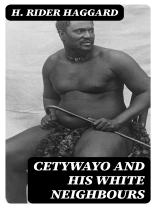In ‘Cetywayo and His White Neighbours, ‘ H. Rider Haggard delves into the complex interplay between the Zulu king, Cetywayo, and European colonial powers in 19th-century Southern Africa. Written with a blend of adventure and historical narrative, the book captures the tumultuous socio-political landscape of the time, providing insights into both Zulu culture and British imperial ambitions. Haggard’s vivid prose and meticulous research offer a nuanced portrayal of Cetywayo, embedding this narrative within the broader context of colonialism and racial tensions that were intensifying during this period. Haggard, an influential figure in the genre of adventure literature, drew from his own experiences in Africa, having served as a solicitor in the region. His firsthand observations of the landscapes, people, and conflicts informed his passionate writing. ‘Cetywayo and His White Neighbours’ not only reflects Haggard’s fascination with Africa but also his apprehensions regarding colonial expansion and its impacts on indigenous cultures, highlighting the moral complexities of imperialism. This compelling narrative is essential for readers interested in colonial history, African studies, and literature that critiques imperialism. Haggard’s adept fusion of storytelling and historical fact makes this work both informative and engaging, appealing to scholars and general readers alike.
عن المؤلف
Sir Henry Rider Haggard (1856–1925), better known as H. Rider Haggard, was a pioneer of the English adventure fantasy genre. Renowned for his African tales and the creation of the iconic character Allan Quatermain, Haggard’s writings have captivated readers for over a century with their vivid imagery and action. Born in Norfolk, England, Haggard was the eighth child of a barrister and was educated at Ipswich Grammar School and Garsington Rectory in Oxfordshire.
Haggard’s professional writing career was sparked by a bet with his brother, which resulted in the novel ‘King Solomon’s Mines’ (1885), but his interests and expertise were not limited to fiction. His observations and experiences during his time in South Africa provided a foundation for non-fiction works such as ‘Cetywayo and his White Neighbours’ (1882), which reflects on the political and cultural climate of the time.
An advocate for agricultural reform and a staunch believer in the value of British colonialism for bringing ‘civilization’ to the colonies, his views are deeply ingrained in his literary works. Haggard’s literary style typically intertwines detailed depictions of landscapes and vigorous narrative with themes of adventure, lost worlds, and ancient civilizations, often employing British protagonists who exemplify Victorian ideals of manliness and imperialism. Despite the controversy over his imperialistic views, Haggard’s work has left an indelible mark on literature and continues to be of historical interest for its portrayal of the period’s attitudes.












